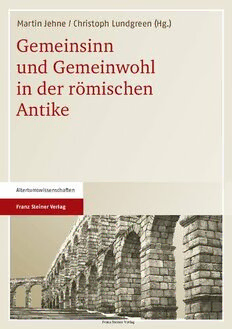
Gemeinsinn und Gemeinwohl in der romischen Antike PDF
222 Pages·2013·2.506 MB·German
Most books are stored in the elastic cloud where traffic is expensive. For this reason, we have a limit on daily download.
Preview Gemeinsinn und Gemeinwohl in der romischen Antike
Description:
English Description: Although the willingness of the ancient elite to finance the interests of the community, especially in regard to Greece, has been explored, this volume places Roman Antiquity at the center of its investigation. Here the author takes the practice carried out in Rome itself as representative of the practice in the Roman provinces. Public spiritedness serves not only as an explanation for a strong commitment, but above all as a discursive measurement. Questions asked include how was public spiritedness successfully appealed to? Conversely, how was a political opponent be disavowed through an alleged defect? Was there a limit to spending or problems with the acceptance of euergetism? This volume concludes two investigations into the composition of sensus communis and civil religion and in both cases it allows us to prove the ancient beginnings of the chimera. German Description: Während die Bereitschaft der antiken Eliten, Belange der Gemeinschaft zu finanzieren, bisher vornehmlich im Hinblick auf Griechenland untersucht wurde, stellt dieser Band die römische Antike in den Mittelpunkt. Die Autoren nehmen dabei sowohl die Diskurse in der Stadt Rom als auch die Praxis in den Provinzen in den Blick. Gemeinsinn, verstanden als innere Disposition auf ein Gemeinwohl, dient dabei nicht nur als Erklärung für starkes Engagement, sondern vor allem als diskursive Größe: Wie wird an Gemeinsinn erfolgreich appelliert? Wie kann, umgekehrt, ein politischer Gegner durch einen unterstellten Mangel an Gemeinsinn desavouiert werden? Gab es ein "zu viel" an Spenden oder Probleme bei der Anerkennung von Euergetismus?Den Band beschließen zwei Untersuchungen zur Rezeption von sensus communis und Zivilreligion – in beiden Fällen lassen sich antike Ursprünge als Chimäre erweisen.
See more
The list of books you might like
Most books are stored in the elastic cloud where traffic is expensive. For this reason, we have a limit on daily download.
